Kabuliwala
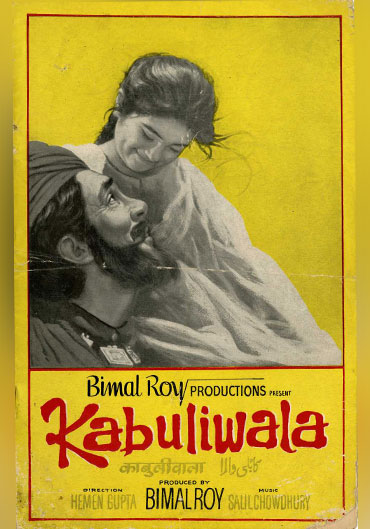
In 1961 Bimal Roy Productions remade Rabindranath Tagore’s Kabuliwala in Hindi.The 1961 cinematic adaptation was a tribute to Tagore based on his renowned short story extolling human compassion in Kabuliwala .The earlier the popular Bangla version was sensitively directed by Tapan Sinha. It starred stalwart Chaabi Biswas as the male protagonist that Balraj Sahni later essayed in Hindi leaving an indelible imprint as the Kabuliwala. As for Mini, the part was played by a newcomer, Baby Sonu. Roy spotted amongst his children’s play mates their neighbour chubby little girl and cast her as Mini.
Rabindranath Tagore’s short story Kabuliwala (1892) is too well known to deserve repeating. But for the uninitiated, it is important to understand that Tagore’s inclusive vision depicted a poignant saga of friendship, innocence, indeed, a poetic text of deep humanity that bridges cultural differences while it critically questions stereo typing of an entire ethnic race – in this case, India’s neighbours, the Afghans. The point of labelling an entire race as “ a terrorists group” renders Tagore’s story a relevant contemporary political statement. Indeed, we are still guilty of viewing the Afghans as suspect, as a people engaged in senseless violence. This may be true of a small section but it has sadly tainted the image of their innocent brethren.
Abdul Rehmat Khan, Tagore’s Afghan hero, belongs to Kabul which was North West part of India then. In that particular period of our social history, it was common for Afghan men to travel to urban India for a lucrative livelihood. Calcutta was amongst the cities they frequently visited. Rehmat, a money lender by profession occasionally sold dry fruits from his native land, The narrator’s daughter, Mini, is mortally scared of Rehmat, the dreaded ‘Kabuliwala’. Wild rumours that these burly men kidnap children projected them as villains. Affected by the rumour, Mini too is terrified that the Kabuliwala will one day kidnap her in his ‘Jhola’. Whenever the wandering salesman visits her writer father, she runs away to hide. Yet slowly, a warm bond springs up between Rehmat and Mini. Mini’s father is pleasantly surprised to witness Mini and the Kabuliwala as inseparable friends. Rehmat shares stories of his motherland while listening attentively to the child’s nonstop chatter to drive away the isolation he experiences in far away Calcutta.

Tagore believed that innocence and trust are the rock-solid foundations of any lasting human relationship, as he speaks of inclusiveness…no matter how culturally distinct one is. In this story for example,Tagore portrays a complete stranger, Rehmat Khan, who is as childlike as Mini, bond with a child who is free social prejudices. For this man, Mini is a beacon of hope, the daughter he yearns for. As the two share secrets, joke, Rehmat wins Mini’s unconditional trust. The narrator is happy to watch this incredible development. But the story takes a dramatic turn when Rehmat is arrested for stabbing a wily customer who owed him money but refused to pay it back. He is sentenced to 10 years imprisonment.
The story’s extraordinary climax takes place the very day Rehmat is released. The timing coincides with Mini’s wedding. His heart aches to get a final glimpse of Mini, before he journeys back home. In Rehmat’s eyes Mini is still that chatty little girl he left behind. Blissfully ignorant Mini has blossomed into a young woman, Rehmat is deeply troubled when truth confronts. He laments for the child he thinks is irrevocably lost and leaves for his country, inconsolable. Readers are left to imagine the rest. The open-ended story points out that truth, however bitter, can pull us out of complacency.
Fortuitously for me, Tagore’s Kabuliwala was staged by IPTA Mumbai on the occasion of Tagore’s 150th birth anniversary. Directed by Ramesh Talwar the play received considerable audience applause. Aasif Sheikh as Kabuliwala and Baby Gungun as Mini, performed with great poignancy to regale the audience.
In my view, Tagore’s story remains a literary land mark in world fiction. His extraordinary saga, Kabuliwala will endure if compassion and unconditional humanity are acknowledged as the true hallmarks of any civil society. Indeed, this particular gem, that is nothing short of a the human document by Tagore, ought to be made compulsory reading in all literature studies curriculum for adults and children to make them compassionate.
Based on
Kabuliwala by Rabindranath Tagore
Produced By
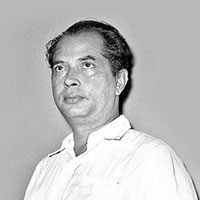
Bimal Roy
Directed By

Hemen Gupta
Writer

Vishram Bedekar
Music
Salil Chaudhary
Artist
Balraj Sahni

Usha Kiran
Edited by

Madhu Prabhavalkar
Cinematography

Kamal Bose

Bimal Roy
Bimal Roy Memorial, All Rights Reserved © 2021
Designed & Developed by Trimoorti Creations.

Bimal Roy
All Rights Reserved © 2021
Designed & Developed by Trimoorti Creations.

